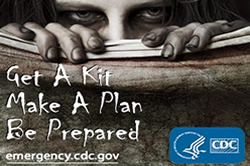December 16th, 2011 by admin in Health Tips
1 Comment »

It’s a moment of sheer panic. You find your child chewing something and holding an open bottle of medicine. You don’t know how much, if any, medicine your child swallowed, or if it will make your child sick.
Unfortunately, as a pediatrician and poison center medical director, I’ve seen this happen all too often. In 2009, in fact, America’s 57 poison centers received more than 575,000 calls involving children younger than 6 and medicines – including prescription and over-the-counter drugs, herbal products, and vitamins.
When that moment of panic happens, it’s good to know that help is just a phone call away. Read more »
*This blog post was originally published at Safe Healthcare*
October 30th, 2011 by GruntDoc in News
No Comments »

The irony here is that Eli Lilly has advanced sepsis care (as a prelude to using their drug), and while Xigris hasn’t panned out, aggressive sepsis resuscitation has.
Eli Lilly is withdrawing drotrecogin alfa (Xigris) from all markets worldwide after a major study failed to show a survival benefit for patients taking the drug.
…
Xigris should be discontinued immediately in patients currently receiving it and should not be started in new patients, the company said.
The trial with the bad news on Xigris was Read more »
*This blog post was originally published at GruntDoc*
September 29th, 2011 by Paul Auerbach, M.D. in Health Tips, Opinion
No Comments »

Perhaps the greatest thrill in attending a summer meeting of the Wilderness Medical Society (WMS) is listening to new, enthusiastic and exciting speakers. They bring new insights and opinions to numerous topics and discussions, which is an essential part of the educational process. This past summer, at the 2010 Annual Meeting of the WMS held in Snowmass, Colorado, Dr. Drew Watters from the Indiana University School of Medicine approached the audience with his observations about neurobiology and survival. It was an innovative approach to a very common topic within wilderness medicine. How does one account for and handle emotions in a time of stress, including the most stressful situation of all—namely, a survival situation? When is it better to think, rather than to react? The objectives of his presentation were to understand to a certain extent survival, the anatomy of thought and perception, the neurobiology of emotions, behavior, emotive and cognitive decisions, and implementation of interventions in situations dominated by emotion.
Anyone who has practiced wilderness medicine knows that bad things happen, sometimes despite the best preparations and intentions. People make bad decisions that can too often be characterized as dumb. If they follow with more bad decisions, the situation Read more »
This post, Handling One’s Emotions In A Survival Situation, was originally published on
Healthine.com by Paul Auerbach, M.D..
May 26th, 2011 by Bryan Vartabedian, M.D. in Health Policy, Humor
No Comments »

 This is good. I knew the CDC was socially tuned-in but this came as a surprise: Preparedness 101: Zombie Apocalypse . It’s every American’s guide to dealing with a zombie attack. You come thinking zombies but take away principles for emergency preparedness. Well done, CDC.
This is good. I knew the CDC was socially tuned-in but this came as a surprise: Preparedness 101: Zombie Apocalypse . It’s every American’s guide to dealing with a zombie attack. You come thinking zombies but take away principles for emergency preparedness. Well done, CDC.
The real take away for those of us looking under the hood: effective health messaging should be creative and fun. While we’ll never be able to measure the true effectiveness of this approach in an emergency, expect the post’s massive traffic to convert important links on emergency preparedness. Hopefully the CDC will release stats on the effectiveness of this campaign.
I’d like to write more, but I’m goin’ to make my kit.
*This blog post was originally published at 33 Charts*
May 16th, 2011 by Dinah Miller, M.D. in Expert Interviews
No Comments »




 When Roy and I were on Talk of the Nation this past week, a called phoned in to ask about her sister. The question was about care in the Emergency Room/Department, so it was a perfect Roy question and he fielded it. I’ve been playing with it since, and wanted to talk more about this particular scenario, because the scenario was very common, and the question was more complicated than it seems.
When Roy and I were on Talk of the Nation this past week, a called phoned in to ask about her sister. The question was about care in the Emergency Room/Department, so it was a perfect Roy question and he fielded it. I’ve been playing with it since, and wanted to talk more about this particular scenario, because the scenario was very common, and the question was more complicated than it seems.
From the transcript of the show:
ANN (Caller): Hi, thank you very much. I would like to ask Dr. Roy (oh, I gave him his blog name here) a question: My sister was admitted to emergency when she cut her wrists, and the doctor on call pulled me aside and said, do you think she was trying to kill herself?
And I said – because my sister is very intelligent – I said, if my sister really wanted to kill herself, she would have done it. I think she’s asking for help.
And so he said – and so he had her see the psychiatrist who was on call, or on duty. And she spoke with him for a while. And he sent her home, saying: Well, if you need me, I’m here.
What I would like to ask Dr. Roy is, what protocol was going on there? Why did they allow that to happen? And what would you change, if you could? Read more »
*This blog post was originally published at Shrink Rap*

















